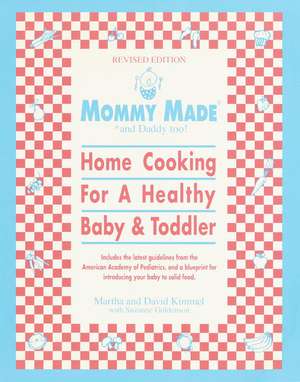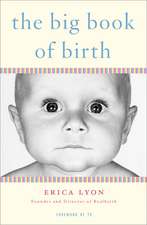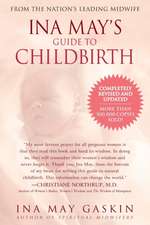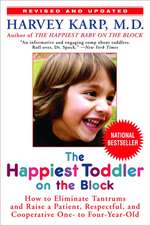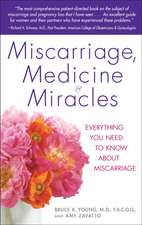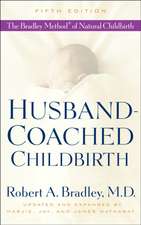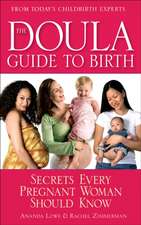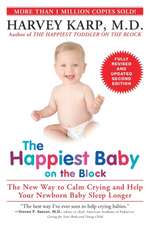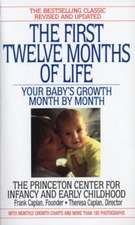Mommy Made and Daddy Too! (Revised): Home Cooking for a Healthy Baby & Toddler
Autor Martha Kimmel, David Kimmel Suzanne Goldensonen Limba Engleză Paperback – 31 mai 2000
Updated for a special 10th anniversary edition, Mommy Made* is filled with 140 easy-to-make recipes that are perfect for introducing your baby to wholesome solid foods. These delicious, kid-tested dishes--which include finger foods, shakes and smoothies, snacks on the go, spoonable treats, and a variety of table dishes--were created with your baby's special nutritional needs in mind, and will help your child establish healthful eating habits that will last a lifetime.
Mommy Made* also includes:
Nutrition advice from birth to three years--incorporating guidelines from the American Academy of Pediatrics
A blueprint for when and how to get your baby started on solid food
Answers to parents' most frequently asked questions: from milk and protein needs to determining portion size, preventing "hunger strikes," and detecting food allergies
Tips on pureeing, straining, and mashing, as well as storage, thawing and reheating, and using the microwave
A handy nutrition glossary, food pyramid, and list of helpful websites
And much more!
Preț: 125.92 lei
Nou
24.10€ • 26.17$ • 20.24£
Carte disponibilă
Livrare economică 01-15 aprilie
Specificații
ISBN-10: 0553380907
Pagini: 336
Dimensiuni: 184 x 235 x 16 mm
Greutate: 0.54 kg
Ediția:Anniversary
Editura: Bantam
Extras
Feeding our children is where our parenting begins. From infancy on, food becomes a significant form of communicating and nurturing. When your infant cries, you run to comfort her with food. In this way she gains her first sense of relief and well-being. At the same time her hunger is being satiated, she is held, cooed to, and stroked. In this way food starts to represent security and love. Later in life food plays a central part in social gatherings, is shared on special holidays, and at times of celebration and mourning, or simply accompanies the daily ritual around the kitchen table when family business is discussed.
Mealtime is one of the richest family experiences you can share with your child. It is especially important in helping her develop healthy attitudes about nutritious foods and learn proper table manners, politeness, and respect for others. These early, positive experiences will have a tremendous impact on your child's future development.
"In psychoanalytic terms, Food and Mother mean the same thing," says Dr. Charles Clegg, a nationally prominent psychiatrist with the U.S.C. School of Medicine, specializing in eating disorders in children and adults. "And eating disorders can begin very early in life and most often do."
Today's working mother is often faced with leaving her child at a very early age. Six weeks is the national average. It is very important for parents to find a nurturing replacement for mother, Dr. Clegg explains. Babies who are cared for by adults who do not hold or touch them, except while feeding them, can wrongly teach baby that eating relieves not just hunger but also anger, depression, anxiety, and loneliness, a pattern that can lead to obesity later in life. Overeating and obesity are usually psychological problems, Dr. Clegg confirms. "Most overeaters do so because their good memories about life's experiences are surrounded by food." The best way to instill in your child a healthy attitude toward food is to spend quality time with her, holding her, playing with her--in short, simply loving her. Food should be a great pleasure, but it shouldn't answer emotional needs.
BREAST OR BOTTLE?
While you may not get much sleep from your child's birth to age six months, you have it easy concerning food choices. The breast, the bottle, or a combination of the two are the only choices of nourishment for your baby until he begins to eat solid foods. (Solid foods are best introduced between baby's fourth- and sixth-month birthday.)
The decision is usually made during pregnancy, which is also the right time to start thinking about your own attitude toward feeding your children. Of course, there's flexibility in these decisions--above all, it has to work for you and your family--but what's done in the beginning can be hard to undo. So now is the time to decide on your philosophy. The very first decision, breast or bottle, is the first step in establishing your own food philosophy.
BREAST MILK
According to the American Academy of Pediatrics, breast milk is the ideal food for infants because of its nutritional composition. Babies who are breast-fed are at reduced risk for ear infections and severe diarrhea. In addition, there is some evidence that for mothers, breast-feeding reduces certain types of cancer and may prevent hip fractures later in life. As a result, most pediatricians urge expectant mothers to breast-feed.
There is also strong evidence that breast milk can strengthen a baby's developing immune system. Breast milk has no curds and is therefore very digestible and never activates allergies, an important consideration if there is a strong allergy history in your family. While breast milk may not prevent your infant from having allergies, it can possibly delay their onset and minimize the severity of their symptoms.
FOR EVERY ACTION THERE'S A REACTION
Experts agree that during the months of breast-feeding, everything you consume will come through your breast milk. Timing of what you eat is as important as what you eat. Use your head with whatever you decide to consume, keeping in mind that your lunch will be your baby's dinner.
Alcohol, for example, is the most rapidly metabolized drug. It will enter your bloodstream and move through your milk very quickly. A cocktail glass of wine will have very little effect, if any, on your baby if consumed after feeding, and the blows will be further softened if the drink is consumed with food. The same goes for caffeine. Spread your intake--two to three cups of coffee or tea a day--over the course of the day and consume it only after feeding your baby.
When breast-feeding, vitamin and mineral supplements you take may not agree with your baby. If you are supplementing your iron to combat post-partum fatigue, we suggest that instead of popping an iron-fortified vitamin capsule, you eat iron-rich foods together with foods that are high in vitamin C, which aids the body's ability to absorb iron. (See vitamin and mineral information, page 46.)
NATURE'S SUPPLY AND DEMAND
Many first-time moms who are breast-feeding ask: "Is my baby getting enough to eat? He seems to be on a feeding frenzy and can't nurse often enough." Many of these moms erroneously feel that they are not producing enough milk. On the contrary, these "feeding frenzies" often coincide with baby's many growth spurts. The first one often occurs right around baby's two-week birthday, and subsequent spurts most often occur at six weeks, three months, and six months. (Of course, your baby may not fit this schedule perfectly.) The more your baby nurses, the more milk you will produce, so you need not worry about your baby's food supply. If it's more milk that the baby wants, take advantage of the situation and express the extra milk to use later. During growth spurts, your baby may demand feedings every two hours for a few days straight. Your body will adjust by producing what your baby needs. It's nature's way of producing the supply to satisfy the demand.
THE BOTTLE AND FORMULA
If you've decided that breast-feeding simply won't work for your lifestyle, you can feel very confident in offering your baby a formula that your doctor recommends. Your baby will thrive, and his well-being will not be compromised on regular formula. Most regular formulas are based on cow's milk. But plain cow's milk should never be given to a baby under one year of age. And under no circumstances should a baby be given goat's milk (See information on milk allergies and intolerances, pages 24-25.)
Your baby can, however, be sensitive or allergic to formula. It may, for example, surprise you that corn syrup solids are commonly used in many infant formulas, considering that corn is number three on the list of common allergy-producing foods that cause sensitivity in infants (cow's milk is number one). (See Common Allergy-Producing Foods, page 24.) If you suspect your baby needs a formula change--diarrhea, irritability, crying, and rashes are some symptoms--discuss your observations with your doctor. There is no reason in the world why you can't play what one mom called "the formula-changing game" with your baby.
Textul de pe ultima copertă
Experts agree that homemade baby food is the healthiest way to feed young children. By making their own baby food, parents can drastically reduce the sugar, salt, artificial colors, fillers, additives, and preservatives in their child's diet. And now making baby food from scratch has never been easier -- with this practical, user-friendly cookbook by Martha and David Kimmel, founders of the phenomenally successful MOMMY MADE* line of baby and toddler food.
Updated for a special 10th anniversary edition, MOMMY MADE* is filled with 140 easy-to-make recipes that are perfect for introducing your baby to wholesome solid foods. These delicious, kid-tested dishes -- which include finger foods, shakes and smoothies, snacks on the go, spoonable treats, and a variety of table dishes -- were created with your baby's special nutritional needs in mind, and will help your child establish healthful eating habits that will last a lifetime. MOMMY MADE* also includes:
-- Nutrition advice from birth to three years -- incorporating guidelines from the American Academy of Pediatrics
-- A blueprint for when and how to get your baby started on solid food
-- Answers to parents' most frequently asked questions: from milk and protein needs to determining portion size, preventing "hunger strikes", and detecting food allergies
-- Tips on pureeing, straining, and mashing, as well as storage, thawing and reheating, and using the microwave
-- A hand nutrition glossary, food pyramid, and list of helpful websites
-- And much more!
